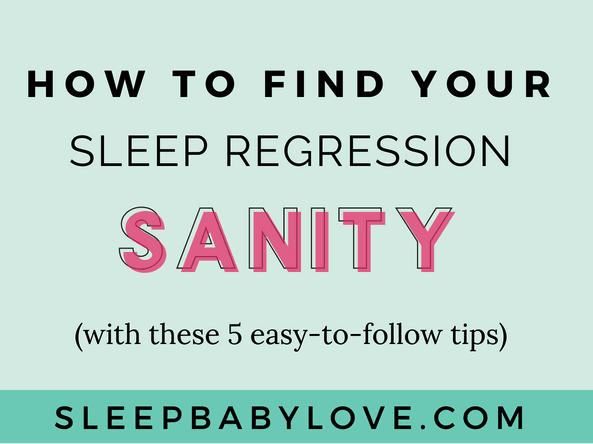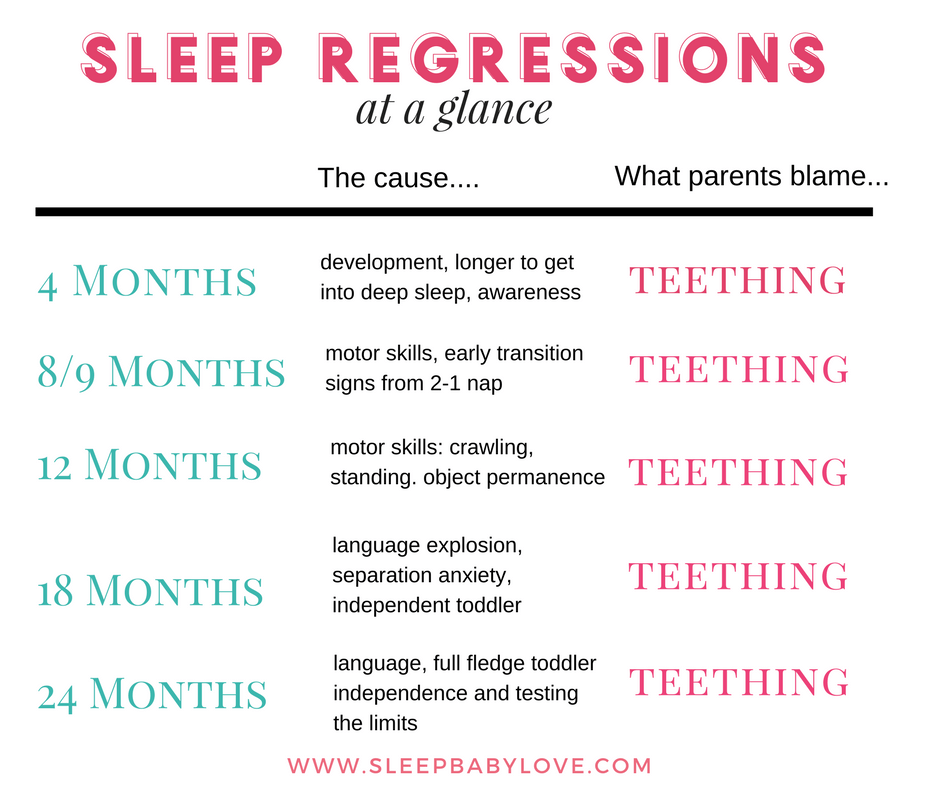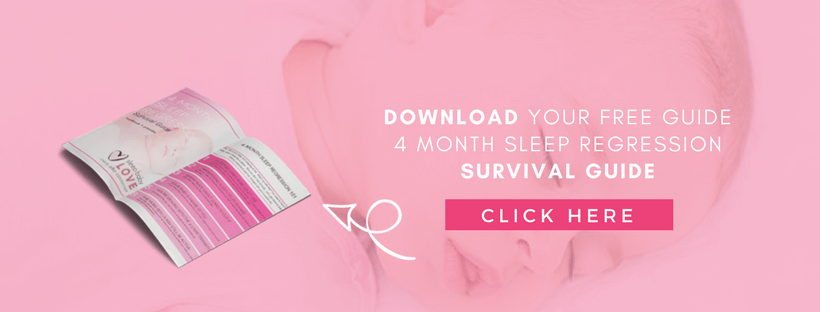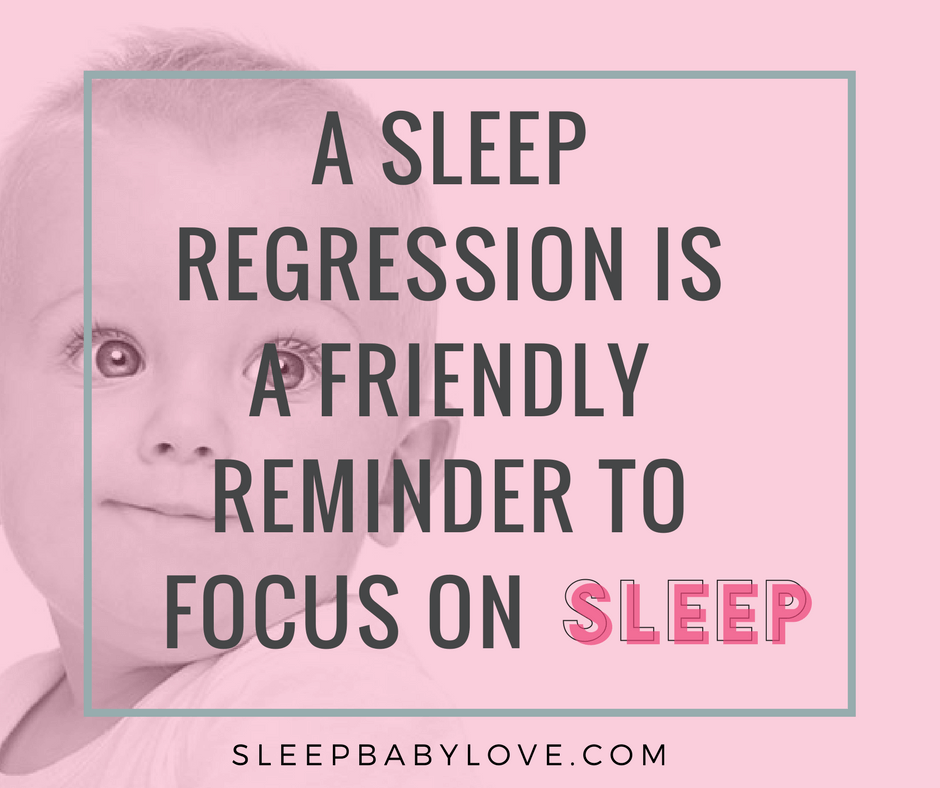How to Survive A Baby Sleep Regression with These 5 Tips
Baby sleep regression. It’s one of those not-so-magical terms that all your non-mom friends have probably never heard of. But you’re now getting to know all-too-well. Whether it’s your baby waking up every half hour to scream her truth to the world or your toddler on a protest against shut-eye, surviving a baby sleep regression is no easy task.
Having sleep issues with your little one right now? Even if you’re just reading up to prep yourself for the future, you’ve come to the right place. I’m going to break down everything you need to know about sleep regressions and the tips that’ll help everyone in your family get back to a solid sleep schedule.
WHAT IS A BABY SLEEP REGRESSION?
Sleep regressions are a bit more than teething. According to the Family Sleep Institute, sleep regression is defined as a “cognitive, physical and/or emotional development that disrupts your normal sleep.”
Essentially, it’s a period of time when a baby (or toddler) goes from consistent, healthy sleep patterns to erratic sleep. Skipping naps, waking up earlier than normal, or only sleeping for a few hours at a time during the night. These are all part of it.
Rest assured, just because it’s called a “regression,” there’s no evidence to show that your baby’s sleep is actually regressing in any way, but it’s still important to try and get them back on a solid sleep schedule.
WHEN DO SLEEP REGRESSIONS TYPICALLY OCCUR?
Every baby is different. It’s important to remember your little guy may experience more or less, and no matter what, it’s totally normal. They typically hit at three major developmental milestones: the 4th month, 8/9 months, and 2-year mark. However they can also occur around 12 and 18 months. Again, every baby is unique.
4TH MONTH REGRESSION
The 4-month sleep regression is typically the first time you see a dip in sleep (especially if your child has been a decent sleeper up until this point). At 4 months, your baby’s sleep becomes more adult-like, so they will have to cycle through various stages (drowsy, light sleep, and, finally, a deep sleep) before being able to fall asleep.
On top of that, short naps aren’t cutting it anymore, and your baby is more aware of you, which means they’d rather hang out with you than fall asleep again.
Best Sleep Tip to Survive The 4 Month Sleep Regression:
If you’re not quite ready to teach independent skills yet, try to focus on nap timing to get keep your baby as well-rested and eliminate sleep debt. as possible. Now’s a great time to also move have your baby taking naps in the right sleep environment. COOL. DARK and QUIET.
8TH (SOMETIMES 9TH) MONTH SLEEP REGRESSION
It’s around 8 months that your baby starts to do a bit more development, like suddenly grasping the idea of object permanence (no pun intended). In other words, your baby starts to understand when you aren’t there.
Oh, and remember how your baby became more aware of you suddenly. and wanted to forego sleep to hang out with you? Well, now they miss you so much; they’re dealing with a bit of separation anxiety.
Best Sleep Tip to Survive The 8-Month Sleep Regression:
Now it’s time to make sure that your baby knows how to fall asleep and stay asleep. Don’t worry, I have your back, and you can learn everything about sleep training in this post: Sleep Training Made Easy: The Ultimate Guide)
12-MONTH REGRESSION
You’ll never forget your baby’s first steps. However, there’s a chance that those first steps will also come with a bit of sleep chaos. Why? Because around the 11-12 month mark, your baby is starting to get stronger and more mobile but is also struggling more with nap time.
Many parents are still dealing with sleep associations like rocking and feeding to sleep. Unfortunately, there can be an issue with sleep by 8-12 months. Now is the right time to start to teach your baby how to fall asleep on their own. You may have heard of sleep training, which is the process of teaching your baby independent skills.
Best Sleep Tip to Survive The 12-Month Sleep Regression:
Eliminate night feedings, if you’re ready. Your baby doesn’t need to eat food after 12 months. You can get the all-clear from your baby’s pediatrician to help you feel more confident.
18-MONTH REGRESSION
Here comes another round of development to disrupt your baby’s sleep! Around 18 months, your baby is just starting to stretch her independence. Sadly, this fledgling independence means she may also try to push the boundaries of her sleep time—struggling to maintain consistency with nap times or sleep through the night (and maybe awake for long periods of time).
Best Sleep Tip to Survive The 18-Month Sleep Regression:
Stay as confident as possible with creating a solid bedtime routine to help your child know what’s expected and eliminate toddler sleep issues.
2-YEAR-OLD SLEEP REGRESSION
Ah, the terrible 2-year-old sleep regression. At this stage, your toddler believes he is a full-fledged little individual. So now more than ever, he is pushing the boundaries of that newfound individuality. You may see him challenging your authority and testing your limits (to test them – for fun!). This makes it pretty darn challenging to stick to a standard sleep schedule.
Best Sleep Tip to Survive The 2-Month Sleep Regression:
Make sure that you maintain control as a parent, in a very loving way. When your 2-year-old wakes in the middle of the night and says that he doesn’t want to sleep in his crib – don’t budge and stay consistent to eliminate night wakings.
Oh, and toddler and preschooler sleep issues don’t just end at two. You may see your three or four-year-old experience sleep regressions as well!
HOW LONG DOES A SLEEP REGRESSION LAST?
The good news is that a true baby sleep regression should only last for a couple of weeks at the most. If your baby’s sleep is affected longer than that, your sleep regression might actually be a not-so-friendly reminder to focus on healthy sleep habits, like creating a great sleep environment for your baby and teaching good sleep habits.
HOW DO I SURVIVE A SLEEP REGRESSION?
After learning about sleep regressions—what they are, when one typically occurs, and how long they last—you may suddenly realize your little one is going through a sleep regression right this second.
Maybe you already knew about it, but are wondering if and how the heck to get through it.
Well, if you’re dealing with a 4th-month sleep regression, I’ll warn you it can be quite a doozy. In fact, it’s one of the most common sleep regression periods (a simple Google search more than confirms this) because there are so many permanent changes taking place during this time.
If you have a 4th-month sleep regression on your hands, I recommend downloading my FREE ebook to get all the best tips on how to get through this time without losing your sanity.
Tips To Get Through A Sleep Regression
Dealing with a sleep challenge outside the 4-month mark? Help give your little kiddo (and the rest of your family) some peace by following these five simple tips:
- Comfort them without making new (or reinstating) bad habits. Don’t try changing habits during a regression, but also be careful not to go backward. Lovingly respond to your baby, but draw boundaries. For example, is she waking during the night? Feel free to approach her and hold her for a few minutes, but put her down before she’s totally asleep.
- Get help from a partner or sleep expert. Sleep regressions can last for a while and occur semi-frequently throughout your baby’s first few years. Because of this, you’re bound to get tired. Trying to manage your baby’s sleep while not getting enough of your own is exhausting. That’s why it’s important to lean on your partner to help tackle the regression battle or get some expert advice to relieve some of the burdens. —>> And if you know that sleep training is in your future – that’s when it’s time to call me (because I literally change my clients’ lives once their whole family is sleeping better).
- Adjust their bedtime, if necessary. Because your baby may not be getting an adequate amount of sleep (which could eventually lead to sleep debt), you may need to consider putting them down for bed slightly earlier than usual to ensure they’re getting the proper amount of sleep.
- Reassess their sleep environment. Is the temperature comfortable? Has the lighting changed at all? Are there any new toys that might distract your toddler? Take a look around the room. Get rid of any screens and ensure all of your baby’s senses (sight, hearing, and smell, specifically) have been considered.
- Consider a comfort object. Depending on what type of sleep regression you’re dealing with, your toddler may be dealing with some separation anxiety. To help comfort a child over 1-year-old, try offering one soft comfort object for them to sleep with without making your presence a necessity. Note: This is only recommended if your toddler is over one year old.
HAVE YOU EVER BEEN THROUGH A SLEEP REGRESSION WITH YOUR BABY? DO YOU HAVE ANY TRIED AND TRUE WAYS TO GET THROUGH IT? SHARE YOUR EXPERIENCES IN THE COMMENTS BELOW.





